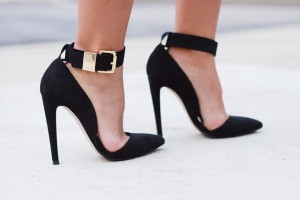
Photo credit: Creative Commons/Flickr/IamKhatu
Do you suffer from pain when wearing high heels? If so, you’re not alone. 71% of women say they experience pain when they wear high heels, according to a 2014 American Podiatric Medical Association survey.
But that doesn’t seem to stop women from continuing to wear high heels. Almost half of all American women own high-heeled shoes, having at least nine pairs on average. Also, 46% of women wear shoes with 3-inch heels or higher; and 39% of women wear high heels weekly.
But our feet were never designed to wear high heels. And when you wear them, you’re forcing your feet to adapt to a shape that they were never meant to function in. When you wear high heels, your heel bone is elevated. This causes an immediate redistribution of your weight on your feet. Your weight shifts from your heel to your forefoot. And, the higher the heel, the greater the weight shift is to the balls of your feet and toes. Plus, most high heels have a narrow toe box, forcing your toes to squeeze into the smaller space.
Painful Lower Extremity Conditions due to High Heels
High-heel usage contributes to the development of several painful conditions, including:
Bunions. Orthopedic surgeons, who used 3D computed tomography (CT) scanning to study women’s feet and ankles while wearing high heels, have found that these shoes produce similar forces on the feet that can lead to hallux valgus or bunions. A bunion is a bump that forms on the side of the big toe or the hallux. When the big toe starts to lean toward the second toe, the condition is called hallux valgus. As the big toe continues to move further toward the second toe, the base of the big toe, or the metatarsophalangeal (MTP) joint, pushes outward from the foot – forming a bunion.
Hammertoes. When you wear high heels, your weight is pushed forward onto your toes. This can cause your toes to bend or curl downward as they’re pushed against the insides of the toe boxes of your shoes – instead of your toes pointing forward. Continual wear of high heels can lead to hammertoes, a permanent curled toe deformity of the foot.
Achilles tendonitis. With regular high-heel use, your Achilles tendon can tighten up and shorten due to your heel being pushed upward, leading to Achilles tendonitis.
Lower back strain and sciatica. Computer scans show that a woman’s center of gravity shifts forward when they wear high heels. This weight shift can affect your posture, causing strain on your lower back and pressure on the nerves in your back that can lead to sciatica. Repetitive high-heel use can also increase your risk of disc compression in your spine, which reduces your body’s stability.
Pain Relief for Aching Feet
If you decide you still don’t want to give up on wearing high heels, there are some things you can do to reduce your risk of painful conditions.
- Make sure your shoes fit properly. Refer to the WalkEZStore’s Shoe Fitting Guide to learn how to fit your shoes properly.
- Wear your high heels in moderation. Switch to flats or lower-heeled shoes, especially when walking on uneven surfaces or running.
- Wear lower-heeled shoes (2 inches or less), whenever possible.
- Select shoes with a gradual slope or pitch instead of heels with a steeper slope.
- Choose shoes with wedged heels. Wedged heels provide more surface area and a more stable base to stand and walk upon.
- Perform foot and calf muscle stretches regularly. These stretches will improve flexibility and help reduce the likelihood of muscle contraction.
- Wear custom foot orthotics like ezWalker® Performance Custom Orthotics. These custom orthotics are specifically designed to the contour of each of your feet and properly support your medial, lateral and trans-metatarsal arches. ezWalker® Custom Orthotics also relieve pressure on the ball of your feet and your toes. When your feet are properly supported due to better biomechanical repositioning of your feet, your gait cycle or the way your walk will improve.
- See your doctor immediately, if you experience pain, swelling or a change in the shape of your foot.
For more information about ezWalker® Performance Custom Orthotics, visit the WalkEZStore.com. ezWalker® Custom Orthotics are ultra thin and ¾ in length , so they fit in any shoe. Get your pair of ezWalker® Custom Orthotics today.
Because … when your feet feel good, you feel good.®


